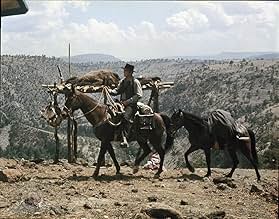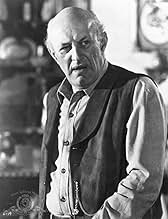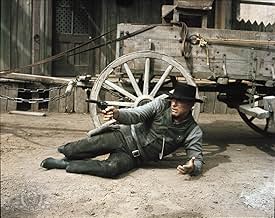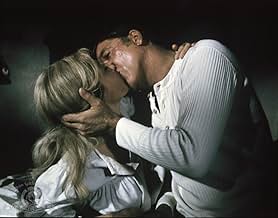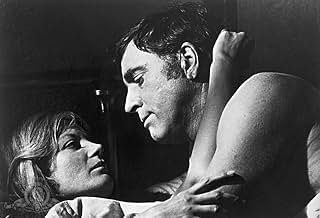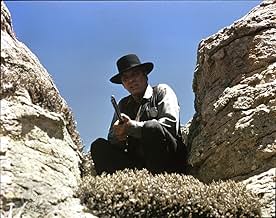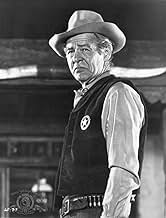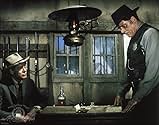IMDb RATING
7.0/10
6.9K
YOUR RATING
A lawman from Bannock arrives in Sabbath to arrest all the cattlemen whose wild celebration the year before resulted in the accidental death of an old man.A lawman from Bannock arrives in Sabbath to arrest all the cattlemen whose wild celebration the year before resulted in the accidental death of an old man.A lawman from Bannock arrives in Sabbath to arrest all the cattlemen whose wild celebration the year before resulted in the accidental death of an old man.
William Watson
- Choctaw Lee
- (as William C. Watson)
Charles Tyner
- Minister
- (as Bill Durham)
- Director
- Writer
- All cast & crew
- Production, box office & more at IMDbPro
7.06.8K
1
2
3
4
5
6
7
8
9
10
Featured reviews
I'm a lawman. Do you know what a lawman is, Crowe? He's a killer of men.
Lawman is directed by Michael Winner and written by Gerry Wilson. It stars Burt Lancaster, Robert Ryan, Lee J. Cobb, Robert Duvall, Sheree North and Richard Jordan. Music is by Jerry Fielding and cinematography by Robert Paynter.
The Lawman of the title is Jared Maddox (Lancaster), who arrives in the town of Sabbath to serve warrants on the group of rowdies responsible for the death of an old man. His cold hearted approach to his work, however, doesn't endear him to the townsfolk.
A man gets caught in his own doing. Can't change what you are, and if you try, something always calls you back.
Traditional Western that deals in the conflict between law and justice, Lawman, like the leading man, broods significantly. The overriding theme of if Maddox's enforcement of the law justify's the means, is tailor made for Winner's affinity for all things vengeance flavoured. Violence is not in short supply, the director gleefully keeping things gory, and the characterisations of the principal players are smartly complex. The excellent cast turn in equally great performances, the Durango locales are beautifully utilised by Winner and Paynter, and the production design is grade "A" quality.
It's an anti-backlash movie of some substance, where spicy and thoughtful dialogue comes forth from the mouths of deftly shaded characters. Highly recommended to Adult Western fans. 8/10
The Lawman of the title is Jared Maddox (Lancaster), who arrives in the town of Sabbath to serve warrants on the group of rowdies responsible for the death of an old man. His cold hearted approach to his work, however, doesn't endear him to the townsfolk.
A man gets caught in his own doing. Can't change what you are, and if you try, something always calls you back.
Traditional Western that deals in the conflict between law and justice, Lawman, like the leading man, broods significantly. The overriding theme of if Maddox's enforcement of the law justify's the means, is tailor made for Winner's affinity for all things vengeance flavoured. Violence is not in short supply, the director gleefully keeping things gory, and the characterisations of the principal players are smartly complex. The excellent cast turn in equally great performances, the Durango locales are beautifully utilised by Winner and Paynter, and the production design is grade "A" quality.
It's an anti-backlash movie of some substance, where spicy and thoughtful dialogue comes forth from the mouths of deftly shaded characters. Highly recommended to Adult Western fans. 8/10
A very Good Western
Here is another great American Western that slipped under my radar.
Where to start, Dircted by Michael Winner, starring Burt Lancaster in whats got to be the best Western I've seen him in so far, with Robert Ryan, Lee J. Cobb, Robert Duval, Albert Salmi, Ralph Waite, JD Cannon, John McGiver, John Hillerman, Wilford Brimley and Sheree North in whats gotta be the biggest & best role I've seen her in. Plus a great supporting cast of all good actors in realistic parts.
This is sort of a psychological/action Western hybrid with an emphasis on very good action, so its got a lot of dialog but its great dialog that sounds true with a good ear for Western slang.
A guy named Ray Moyer did the set design, and this is another standout of this film, a great job, he is as good as Carlo Simi, I couldn't believe how much detail was crammed into this film. Everything looks spot on, the town set is fantastic, the ranch's are great, interiors highly detailed. Roberto Silva & Herb Westbrook did the Art direction and they deserve mention too.
There is a whore house set thats great it features a crippled gambler/pimp who hobbles about on crutches who is a past friend of Maddox, he has this skull clock sitting on his card table that is a nice touch. All the whores are real looking women not caricatured or dressed overly flashy.
The landscape & town sets were all shot in Durango, Mexico and some of the buttes featured were just beautiful, don't remember seeing these locations before but the rock in the outcrops look similar to those seen in the Magnificent Seven.
The story basically revolves around Bannock Marshall Jared Maddox (Lancaster) a "mankiller" he has the nickname "The Widowmaker". Maddox is after a bunch of drovers who shot up his town during a drunken spree killing an old man. The drovers work for big time cattleman Vincent Bronson (Cobb) near the town of Sabbath, New Mexico.
Maddox has a reputation for being quick on the draw, and always getting his man, we first see him riding into Sabbath with a corpse. He ties up at the Sabbath Marshall Cotton Ryan's (Ryan) office and he tells Ryan what happened and who he's after. Ryan tells him that the men all work for Bronson, and that he'll ride out to the ranch & tell them that Maddox wants to bring them back for trial to Bannock. Bronson's men decide to tough it out and face Maddox.
This film even has a love interest thats handled the just the way it should be in that it doesn't detract from or slow down the narrative one iota.
The score is nothing that sticks in head and pretty forgettable, its not an Spaghetti Western , no picaresque characters or humor, but it does have some SW influenced action as do a lot of the post Leone & Peckinpah films of the 70's.
The ending is worth the price of the DVD which I just ordered. Michael Winner best film, IMO.
Check it out you wont go wrong.
Where to start, Dircted by Michael Winner, starring Burt Lancaster in whats got to be the best Western I've seen him in so far, with Robert Ryan, Lee J. Cobb, Robert Duval, Albert Salmi, Ralph Waite, JD Cannon, John McGiver, John Hillerman, Wilford Brimley and Sheree North in whats gotta be the biggest & best role I've seen her in. Plus a great supporting cast of all good actors in realistic parts.
This is sort of a psychological/action Western hybrid with an emphasis on very good action, so its got a lot of dialog but its great dialog that sounds true with a good ear for Western slang.
A guy named Ray Moyer did the set design, and this is another standout of this film, a great job, he is as good as Carlo Simi, I couldn't believe how much detail was crammed into this film. Everything looks spot on, the town set is fantastic, the ranch's are great, interiors highly detailed. Roberto Silva & Herb Westbrook did the Art direction and they deserve mention too.
There is a whore house set thats great it features a crippled gambler/pimp who hobbles about on crutches who is a past friend of Maddox, he has this skull clock sitting on his card table that is a nice touch. All the whores are real looking women not caricatured or dressed overly flashy.
The landscape & town sets were all shot in Durango, Mexico and some of the buttes featured were just beautiful, don't remember seeing these locations before but the rock in the outcrops look similar to those seen in the Magnificent Seven.
The story basically revolves around Bannock Marshall Jared Maddox (Lancaster) a "mankiller" he has the nickname "The Widowmaker". Maddox is after a bunch of drovers who shot up his town during a drunken spree killing an old man. The drovers work for big time cattleman Vincent Bronson (Cobb) near the town of Sabbath, New Mexico.
Maddox has a reputation for being quick on the draw, and always getting his man, we first see him riding into Sabbath with a corpse. He ties up at the Sabbath Marshall Cotton Ryan's (Ryan) office and he tells Ryan what happened and who he's after. Ryan tells him that the men all work for Bronson, and that he'll ride out to the ranch & tell them that Maddox wants to bring them back for trial to Bannock. Bronson's men decide to tough it out and face Maddox.
This film even has a love interest thats handled the just the way it should be in that it doesn't detract from or slow down the narrative one iota.
The score is nothing that sticks in head and pretty forgettable, its not an Spaghetti Western , no picaresque characters or humor, but it does have some SW influenced action as do a lot of the post Leone & Peckinpah films of the 70's.
The ending is worth the price of the DVD which I just ordered. Michael Winner best film, IMO.
Check it out you wont go wrong.
One of The Greatest Post-Western Westerns
This movie stands out as one of the best of a subgenre that doesn't have a lot of great movies representing it. The Post-Western Westerns starting coming out in the mid-sixties until Westerns were hard to come by during the mid-seventies.
These "modern" westerns are distinguished by turning the "white hat good guy" and "black hat bad guy" on their ear. The good guys are not only not perfect, but ruefully flawed, and the bad guys are often people who made mistakes along the way and would not be a threat to society if they were left alone. Examples of other "modern" westerns are Unforgiven (The Clint Eastwood movie), Hang 'Em High (notice a pattern- another Eastwood movie), and Dances With Wolves.
Lancaster's Marshall Maddox is doing his job, but at this stage in his career, he is a walking, talking, killing machine who is ready to kill anyone who gets in his way, and some people who want very much to get out of his way. He is typical of the modern western. Where older westerns emphasized clear moral and ethical boundaries, modern westerns portray a world much less certain and easy to navigate. A world full of shadows and lots of gray ambiguities.
This is a perfect representation of how people felt in 1971. This is a very good film.
These "modern" westerns are distinguished by turning the "white hat good guy" and "black hat bad guy" on their ear. The good guys are not only not perfect, but ruefully flawed, and the bad guys are often people who made mistakes along the way and would not be a threat to society if they were left alone. Examples of other "modern" westerns are Unforgiven (The Clint Eastwood movie), Hang 'Em High (notice a pattern- another Eastwood movie), and Dances With Wolves.
Lancaster's Marshall Maddox is doing his job, but at this stage in his career, he is a walking, talking, killing machine who is ready to kill anyone who gets in his way, and some people who want very much to get out of his way. He is typical of the modern western. Where older westerns emphasized clear moral and ethical boundaries, modern westerns portray a world much less certain and easy to navigate. A world full of shadows and lots of gray ambiguities.
This is a perfect representation of how people felt in 1971. This is a very good film.
A Great, Often Misunderstood Western
There are many fine performances in this film. Robert Ryan is the former hero who now admits he "eats dirt" for a living. Sheree North is at her finest as a lady with a past whose love for her man is unappreciated. Robert Duvall plays an interesting character who pleads not to have his life ruined (but watch the opening scenes closely to see just what he does to someone else's livelihood). Lee J. Cobb gives his usual strong performance as a guy who leads a wild bunch but gave up being wild long ago. I've read many of the reviews on imdb concerning this western, & I have to conclude that only a few writers have understood it well. It's about good & evil, yes, but who is good & who is evil? Does "good" have to be 100% good & does "evil" have to be 100% evil? Obviously not, & that's what this film is about. And towards the very end of the film, just when we think we've figured out who is "mostly good" & who is "mostly evil" we find that even then we may be mistaken. Throughout the film, it seems easy to understand Burt Lancaster's character, because he's so "black & white" & so one dimensional. That's what makes the ending so shocking & so thought provoking: we find out we didn't know Sheriff Maddox (Lancaster) at all, we just thought we did. And aren't appearances deceiving? When I watched it on DVD, "Lawman" caused quite an extended discussion amongst viewers following the film's conclusion, mostly about "Just what happened there?!" That's the sign of an outstanding film, so I rate it 9/10.
Most Underrated Film I've Ever Seen
It's crazy the way some films get labeled "brilliant" while others get ignored just because of bad timing or poor studio backing or any # of things.
I'm not a fan of Westerns. I don't consider this a Western. I consider it a wonderfully written, directed, and acted work of art.
Gerald Wilson's script, and its interpretation by the three leads, is so skillful that it functions almost as a poem on the themes of "man," "animal," "law," and euphemism.
Micheal Winner's direction is beyond good. Every cut--early on he uses many overlays, then as the film builds he uses jarring smash cuts--is breathtaking in its thoughtfulness and thematic effect. And he knows when to lay off the music. An eerily quiet early showdown scene with Burt Lancaster, Albert Salmi, and Richard Jordan (with Robert Ryan in the background) is probably the most creative and effective such scene I've ever witnessed, Leone notwithstanding.
Then there's the acting. Lancaster is THE great underrated American actor, and it's because so many of his best performances came after he'd turned 50. I truly think this is his best. He says so much with his eyes, and especially with a tiny flutter or break in his voice. The range he achieves within this supposedly rigid character is phenomenal. From the knockout first scene between him and Ryan, to the touching scenes between him and Sheree North--you'll never see a sadder face than his when North gets out of the bed--to the scene by the river with Jordan, he creates a full character simply by being a great actor. No gimmicks or wackiness. He just out-acts anyone on the screen today.
Ryan equals Burt's performance. This is the best of the ten or so Ryan performances I've seen. Like Lancaster as he aged, Ryan is unafraid to play an aging, weakening character. Seeing him come to life briefly when he takes on a "Bronson man" is thrilling.
Lee J. Cobb has less to do but does a heck of a lot with it. The supporting actors are, to a person, superb. But special kudos must go to Richard Jordan.
This is a film that challenges the macho stereotype and finds it wanting. Lancaster's character offers a complex alternative. An absolute must-see. Tremendous script, unparalleled acting, superb directing. Oh, and the locations are just breathtaking. It's criminal that there's no true widescreen of Lawman available. Anyway, SEE IT.
I'm not a fan of Westerns. I don't consider this a Western. I consider it a wonderfully written, directed, and acted work of art.
Gerald Wilson's script, and its interpretation by the three leads, is so skillful that it functions almost as a poem on the themes of "man," "animal," "law," and euphemism.
Micheal Winner's direction is beyond good. Every cut--early on he uses many overlays, then as the film builds he uses jarring smash cuts--is breathtaking in its thoughtfulness and thematic effect. And he knows when to lay off the music. An eerily quiet early showdown scene with Burt Lancaster, Albert Salmi, and Richard Jordan (with Robert Ryan in the background) is probably the most creative and effective such scene I've ever witnessed, Leone notwithstanding.
Then there's the acting. Lancaster is THE great underrated American actor, and it's because so many of his best performances came after he'd turned 50. I truly think this is his best. He says so much with his eyes, and especially with a tiny flutter or break in his voice. The range he achieves within this supposedly rigid character is phenomenal. From the knockout first scene between him and Ryan, to the touching scenes between him and Sheree North--you'll never see a sadder face than his when North gets out of the bed--to the scene by the river with Jordan, he creates a full character simply by being a great actor. No gimmicks or wackiness. He just out-acts anyone on the screen today.
Ryan equals Burt's performance. This is the best of the ten or so Ryan performances I've seen. Like Lancaster as he aged, Ryan is unafraid to play an aging, weakening character. Seeing him come to life briefly when he takes on a "Bronson man" is thrilling.
Lee J. Cobb has less to do but does a heck of a lot with it. The supporting actors are, to a person, superb. But special kudos must go to Richard Jordan.
This is a film that challenges the macho stereotype and finds it wanting. Lancaster's character offers a complex alternative. An absolute must-see. Tremendous script, unparalleled acting, superb directing. Oh, and the locations are just breathtaking. It's criminal that there's no true widescreen of Lawman available. Anyway, SEE IT.
Did you know
- TriviaSome scenes were shot in the same Western location town as Howard Hawks's final film, Rio Lobo (1970). Michael Winner says in his autobiography that the crews of both films met in the middle of the town, as in a Western showdown, but without guns.
- GoofsWhen Maddox (Burt Lancaster) shoots the horse out from under Vernon Adams (Robert Duvall), the man who is thrown from the falling horse has a full head of hair, and is clearly a stunt double. Robert Duvall was totally bald on top in this movie. The stuntman even tries to hide the fact by placing his hand right on top of his head as he comes up, but the full head of hair is still visible.
- Quotes
Bannock Marshal Jared Maddox: I remember you at Fort Bliss.
Sabbath Marshal Cotton Ryan: That's my trouble. Everybody remembers me at Fort Bliss.
- Alternate versionsAll UK video versions are cut by 4 secs to remove a cruel horse-fall.
- ConnectionsFeatured in Sven Uslings Bio: Lawman (2019)
- How long is Lawman?Powered by Alexa
Details
Box office
- Gross US & Canada
- $5,940,000
- Runtime
- 1h 39m(99 min)
- Color
- Aspect ratio
- 1.85 : 1
Contribute to this page
Suggest an edit or add missing content


